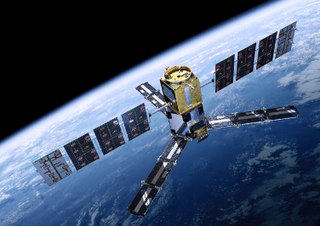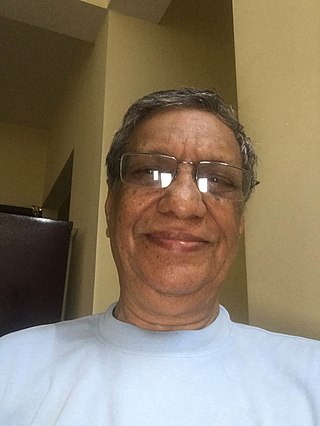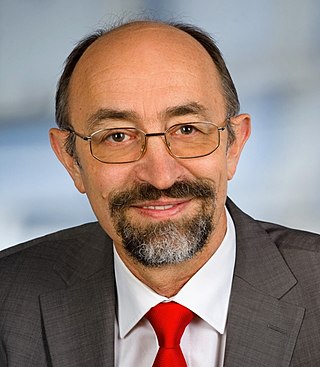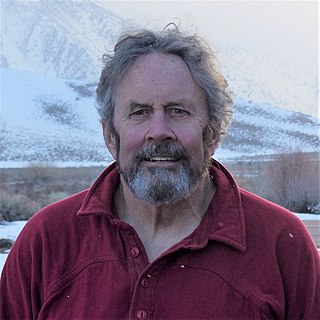Related Research Articles

Hydrology is the scientific study of the movement, distribution, and management of water on Earth and other planets, including the water cycle, water resources, and drainage basin sustainability. A practitioner of hydrology is called a hydrologist. Hydrologists are scientists studying earth or environmental science, civil or environmental engineering, and physical geography. Using various analytical methods and scientific techniques, they collect and analyze data to help solve water related problems such as environmental preservation, natural disasters, and water management.

Rafael Luis Bras is a Puerto Rican civil engineer best known for his contributions in surface hydrology and hydrometeorology, including his work in soil-vegetation-atmosphere system modeling.

Soil Moisture and Ocean Salinity (SMOS) is a satellite which forms part of ESA's Living Planet Programme. It is intended to provide new insights into Earth's water cycle and climate. In addition, it is intended to provide improved weather forecasting and monitoring of snow and ice accumulation.

Soil Moisture Active Passive (SMAP) is a NASA environmental monitoring satellite that measures soil moisture across the planet. It is designed to collect a global 'snapshot' of soil moisture every 2 to 3 days. With this frequency, changes from specific storms can be measured while also assessing impacts across seasons of the year. SMAP was launched on 31 January 2015. It was one of the first Earth observation satellites developed by NASA in response to the National Research Council's Decadal Survey.
The following outline is provided as an overview of and topical guide to hydrology:

Prem Chand Pandey is an Indian space scientist, planetary scientist, and academic in the fields of satellite oceanography, remote sensing, atmospheric science, the Antarctic and climate change, and also he is the founding director of the National Centre for Polar and Ocean Research (NCPOR).
Frank Wentz is the CEO and director of Remote Sensing Systems, a company he founded in 1974, which specializes in satellite microwave remote sensing research. Together with Carl Mears, he is best known for developing a satellite temperature record from MSU and AMSU. Intercomparison of this record with the earlier UAH satellite temperature record, developed by John Christy and Roy Spencer, revealed deficiencies in the earlier work; specifically, the warming trend in the RSS version is larger than the University of Alabama in Huntsville (UAH) one. From 1978 to 1982, Wentz was a member of NASA's SeaSat Experiment Team involved in the development of physically based retrieval methods for microwave scatterometers and radiometers. He has also investigated the effect of climate change on satellite-derived evaporation, precipitation and surface wind values. His findings are different from most climate change model predictions.

Jasper A. Vrugt is a Dutch scientist/engineer/applied mathematician known for his work in the earth sciences: surface hydrology, soil physics, hydrogeophysics, hydrometeorology, and geophysics. Vrugt is an assistant professor at the University of California, Irvine and holds a joint appointment in the Department of Civil and Environmental Engineering and the Department of Earth System Science. He also holds a part-time appointment as associate professor at the University of Amsterdam, Faculty of Science (CGE).
James S. (Jay) Famiglietti is the director of the Global Institute for Water Security at the University of Saskatchewan in Saskatoon, Canada. Prior to that he was the Senior Water Scientist at NASA Jet Propulsion Laboratory in Pasadena, CA and a professor of Earth System Science at the University of California, Irvine. He is a leading expert in global water issues and in raising awareness about the global water crisis and in particular, about global groundwater depletion.
The Cyclone Global Navigation Satellite System (CYGNSS) is a space-based system developed by the University of Michigan and Southwest Research Institute with the aim of improving hurricane forecasting by better understanding the interactions between the sea and the air near the core of a storm.
Soroosh Sorooshian is an Iranian-born American civil engineer, and educator. He is a distinguished professor of civil and environmental engineering at the University of California, Irvine and currently serving as the Director of the Center for Hydrometeorology and Remote Sensing.

Kamal Sarabandi is an Iranian-American scientist and the Fawwaz T. Ulaby Distinguished University Professor of EECS and the Rufus S. Teesdale endowed Professor of Engineering at the University of Michigan, where he teaches and conducts research on the science and technology of microwave and millimeter wave radar remote sensing, wireless technology, electromagnetic wave propagation and scattering, metamaterials, antenna miniaturization, and nano antennas.
Elfatih Ali Babiker Eltahir is a Sudanese -American Professor of Civil and Environmental Engineering, H.M. King Bhumibol Professor of Hydrology and Climate, and Director of the MIT-UM6P Research Program at the Massachusetts Institute of Technology.

Professor Günter Blöschl is an Austrian hydrologist, engineer and academic.
Dr. Y. S. Rao is a professor at the Centre of Studies in Resources Engineering, Indian Institute of Technology Bombay, Mumbai, India. He is working in the field of microwave remote sensing and land based applications for more than 34 years. His early research was focused on the use of Synthetic Aperture Radar (SAR) interferometry for landslides and land deformation monitoring, Digital Elevation Model generation, snow and glacier monitoring. He is also actively involved in developing several techniques for soil moisture estimation using passive and active microwave remote sensing data for more than 25 years. His current research involves SAR Polarimetry for crop characterization, classification, biophysical parameter retrieval using linear and compact-pol SAR data. Apart from applications, he has also contributed in the field of Polarimetric SAR system calibration and software tool development.

Jeff Dozier is an American snow hydrologist, environmental scientist, researcher and academic. He is Distinguished Professor Emeritus and Founding Dean of the Bren School of Environmental Science & Management at the University of California, Santa Barbara.
Mahta Moghaddam is an Iranian-American electrical and computer engineer and William M. Hogue Professor of Electrical Engineering in the Ming Hsieh Department of Electrical and Computer Engineering at the University of Southern California Viterbi School of Engineering. Moghaddam is also the president of the IEEE Antennas and Propagation Society and is known for developing sensor systems and algorithms for high-resolution characterization of the environment to quantify the effects of climate change. She also has developed innovative tools using microwave technology to visualize biological structures and target them in real-time with high-power focused microwave ablation.
Amir AghaKouchak is an Iranian American civil engineer, academic and researcher. He is a Professor of Civil Engineering, Environmental Engineering, and Earth System Science at University of California, Irvine.

Eni G. Njoku is a Nigerian-American scientist specializing in microwave remote sensing. He worked at the Jet Propulsion Laboratory (JPL), California Institute of Technology, where he was responsible for developing techniques for sea surface temperature and soil moisture remote sensing using microwave radiometers. He produced the first microwave-derived sea surface temperature maps from space, and developed the first application of deployable mesh antennas for satellite Earth observation. From 2008-2013, he served as project scientist of NASA's first soil moisture mission, the Soil Moisture Active Passive (SMAP) mission, launched in 2015.
Christa Peters-Lidard is an American hydrologist known for her work on integrating land surface modeling and data assimilation, particularly with remotely sensed measurements of precipitation.
References
- ↑ "2015 elevated fellow" (PDF). IEEE Fellows Directory.
- ↑ "Professor Dara Entekhabi".